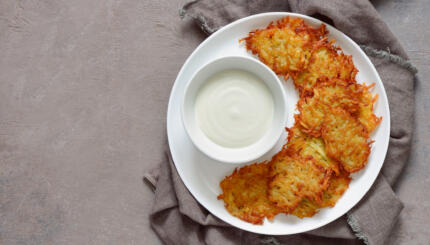Many American Jewish families treasure a pair of Shabbat candlesticks, a prayer shawl, or a dog-eared Hebrew prayer book from the old country. But when I was growing up, the most precious heirloom in my Russian-Jewish family was a fat, foot-high Laughing Buddha. The porcelain statue had a place of honor in our living room wherever we lived, not for religious reasons or even aesthetics, but because it was “from China” like us.
“Our” China was Harbin in what was then Manchuria, a city that Jewish immigrants like my grandparents helped build in the first half of the 20th century. There Jews discovered, to their astonishment, that anti-Semitism was not part of Chinese culture or the Chinese legal system.
The relationship between the two communities was solidified when it became obvious that Chinese people shared Jewish values: devotion to family, respect for ancestors, a strong work ethic and a reverence for education.
By the time I was born in 1947, many Russian-Jewish “Harbintsy,” as they called themselves, had fled war and revolution in China and regrouped in my home town of San Francisco. The social network they had enjoyed in Harbin was transplanted to California.
I grew up hearing glorious tales about life in China from my grandmother, my father, my aunt, and their friends. I also spent hours as a child paging through the tiny black-and-white photos in my father’s Harbin album. The life pictured there was romantic, exotic, and unique, a Russian-speaking whirl of parties, ice skating, horse races, concerts, Zionist scout parades, and business ventures. The lessons I learned about community have stayed with me, and so has the sense of sanctuary and well-being that China represented.
After I moved away from San Francisco, however, I found it hard to explain to people where Harbin was located, let alone to describe its complex history. I gave up the idea of writing about Harbin Jews after my aunt declared, “No matter what a person writes, a dozen other people will jump in and say, ‘I was there, and it wasn’t that way at all!'” Having witnessed decades of drama among Harbintsy, I knew she was right.
Early in the new millennium, my perspective changed. After most of the original Harbin pioneers died, their descendants discovered that the city’s historic Jewish buildings, including two synagogues, had become landmark designations and tourist attractions! The internet made ancestry research easier, and people suddenly wanted to explore their Harbin roots. Before I knew it, I was part of an informal descendants’ network of Harbintsy in cyberspace and was also invited to write articles about Harbin history.
The most recent project is Harbin, China: Past/Present, an exhibit on view through Oct. 4, 2019 at the Museum at Eldridge Street in New York City. Located appropriately in a restored Eastern European synagogue in Chinatown, the show celebrates several families with links to Harbin history, including mine.
Exploring my family story as an adult led me to take a hard look at the Harbintsy tendency to romanticize the past. I now realize that immersing themselves in nostalgia was how my relatives and many of their friends handled pain and loss, not to mention the insecurity of being immigrants. I’m sure they also were trying to protect themselves and the younger generation from nightmarish memories.
I knew my grandfather was abducted and murdered during the brutal Japanese occupation of Manchuria in the 1930s, possibly by anti-Semitic White Russian collaborators. But I had no idea about the widespread horrors imposed on civilians until I began researching the era. My distance from this period allows me to confront issues my relatives wanted to bypass, including the ramifications of intergenerational trauma.
I have even researched the Laughing Buddha that now resides in my house. It turns out we were wrong years ago in thinking he was an incarnation of Gautama Buddha, the enlightened spiritual master. Laughing Buddha is the nickname of a 10th century Chinese Zen monk, a wanderer like my ancestors whose large belly and wide grin represent abundance and happiness. Abundance and happiness are what my ancestors struggled so hard to pass down to me, along with a lifelong appreciation for Chinese culture. His smile reminds me they succeeded.



